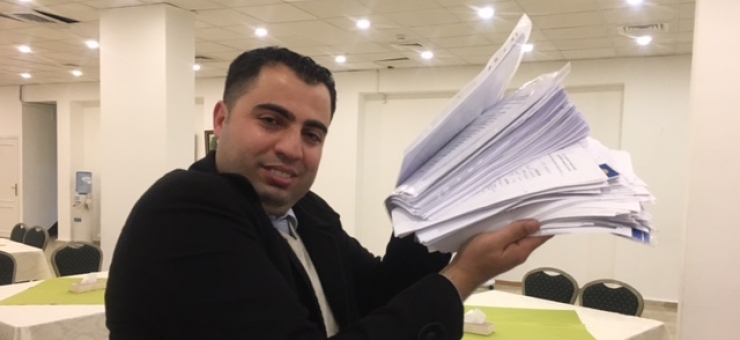Palestinian union NTUBI - Organising Success

Workers and members of the Palestinian union for the Finance Sector - the NTUBI - have just recorded a huge surge in membership immediately following a joint UNI / NTUBI workshop held on Friday and Saturday last week. Following the workshop the 56 attendees went back to work and carried out their training. As a result, in just two days they have recorded an increase of 479 members, all signed up and application forms received.
The Finance sector in Palestine - both the West Bank and Gaza - employs approximately 11,000 workers in 20 companies. Despite the conditions of the Occupation - oppression, isolation, checkpoints, poverty, high unemployment and violence - the sector provides services and work for the population. In this context the efforts to organise a trade union are way beyond the experience of most trade unions around the world.
The NTUBI was formed in 1996 and its two leaders, Mr. Ahmed Tomeze and Mr. Ali Shafout, have done an amazing job to establish the union with 1200 members before the training workshops. Testament to their efforts was the fact that the welcoming speakers included representatives from the PGFTU, the Palestinian Authority, the Solidarity Center and senior management from Al Quds and the Palestinian Islamic Bank. The workhops were run by UNI and financed by the Swedish Finance Union Finans Forbundnet - solidarity work of the highest order.
The workers were formed into teams, given areas to work on and sent back out to their own branch offices and workplaces to implement the plan. They targeted talking to 714 workers over 3 days.They were trained in one to one recruitment and organising workers into the union through sustainability.
In response to the visit of Vice President of the US Mike Pence to Jerusalem a General Strike was called on what would have been the third day of activity. Thus the workers were urged to do what they could in one and a half days and report back on the second day in the afternoon. Conditions at the checkpoints and the organisation of the strike impacted on the work. The General strike was supported by the vast majority of the population, with most shops and stores closed (including banks). There were incidents at checkpoints where protests had been organised with two Palestinian people shot and killed in Nablus.
The 479 is a figure relating to forms collected in to the union on the second day. The chat group set up for activists reports that there are many more forms to come back to the union office. Even with just the 479 this represents a 40% increase in membership in less than two days and seriously improves the unions strength and finances. The next stage now is to develop the campaign outside to Gaza and to the rest of the workforce and an organisising committee has been set up to do this. In the meantime the union will now table applications for official recognition in the banks and start the bargaining process.
The Palestinian Youth were heavily represented in the 56 workers who attended the workshops. Over 40 of them were in their twenties or early thirties, which is a great sign for the future. Women too were very well represented and every one ofthe 9 teams established had a woman leader. The NTUBI is breaking through - and it is the workers and their families who are set to benefit.

